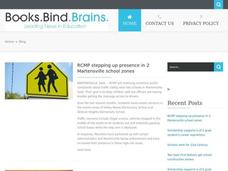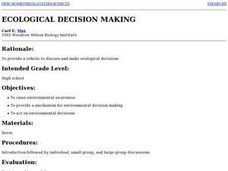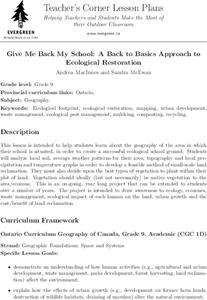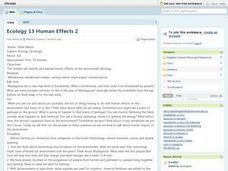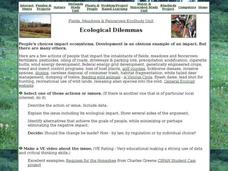Curated OER
Ecology: The Food Web
In this ecology worksheet, students match the vocabulary to the definitions, then represent producers and consumers by drawing a Pyramid of Numbers.
Curated OER
Ecological Organization
High schoolers explain the impact of ecological organization. In this web-based lesson, students work through a series of activities to explain how biotic and abiotic interactions occur in ecosystems.
Curated OER
Prairie Restoration and Prairie Ecology
Students collect data as they identify and classify native prairie plants and insects. They create their own population study using a variety of sampling techniques to determine the population density of various species. Students...
Curated OER
Trophic Ecology of Humans
students analyze the place of humans among the tropic levels by observing what we eat. They calculate the caloric content of several foods commonly eaten by humans and calculate the total energy cost to grow, process, transport, store...
Curated OER
Ecological Decision Making
Students, beginning individually and later in small groups use the decision making model to address the question of reintroducing the wolf into Yellowstone National Park. Each small group elects a spokesperson to report to the class,...
Curated OER
Designing an Ecologically Sound City
Fifth graders design an "ecologically sound" city. They write laws for the city to help make all citizens aware of their ecological responsibilities and propose alternative power sources for light and heat.
Curated OER
You Are What You Drink!
Students explore water treatment systems. In this water conservation ecology lesson, students identify and explain several processes used for water treatment and define related vocabulary after listening to content information given...
Curated OER
Who Owns Water
Students role play how water is allocated to different holders of water rights. In this ecology lesson plan, students identify the different water rights available. They explore problems associated with water use including drought,...
Curated OER
Decision Making a Mock Town Meeting on a Proposed Tank Farm
Students identify the potential hazards to the water supply. In this ecology instructional activity, students role play a town hall meeting to discuss the proposal of a storage tank construction in their place. They present their...
Curated OER
AP: Chapter 52: Population Ecology
For AP biology or ecology classes, here is a worksheet that explores population growth. Carrying capacity, limiting factors, and k-strategies are dealt with using short-answer questions.
Howard Hughes Medical Institute
Creating Chains and Webs to Model Ecological Relationships
The sustainability of an ecosystem depends on many factors and changes constantly. Young scholars consider these factors as they use a set of cards to create food webs. They review key scientific vocabulary such as predator, prey,...
Howard Hughes Medical Institute
Winogradsky Columns: Microbial Ecology in the Classroom
Substances that decompose with the help of living organisms do so at different rates. Scholars experiment with Winogradsky columns to determine the rate of decomposition, the oxygen and sulfide content changes, and bacteria levels. The...
Curated OER
Ecological Organization
Students study biomes and their major characteristics. In this biomes lesson students draw a climatogram and discuss climate of a specific area.
Forest Foundation
The Web of Life
Producers, herbivores, carnivores, omnivores, decomposers. To begin a study of the forest ecosystem, learners examine the connections among the members of ecological communities.
Curated OER
Plants and Ecosystems
The relationships within and between ecosystems can be explored. after examining an area for living and non-living things students complete the same examination in the forest ecosystem. Students identify abiotic and biotic elements in an...
Curated OER
Ghostbusting in the Chesapeake
Ghost pots, fishing gear lost during crabbing expeditions, continue to trap crabs that are never collected. Increase your budding ecologists' awareness of human impact on the environment as well as conservation efforts using this...
Curated OER
Habitat Basics
First graders get out and explore two different habitats to examine how each one meets the needs of the plants and animals that dwell there. They discuss what they've learned about animal habitats as they explore the outdoor environment....
Intel
Insects: The Good, The Bad, The Ugly
What would the world be like with no insects? Ponder this question using a research-based STEM unit that encourages scholars to investigate insects from both a beneficial and hazardous perspective. They learn about insect behaviors,...
Curated OER
Give Me Back My School: A Back to Basics Approach to Ecological Restoration
Ninth graders research local geography to create successful, ecological school landscaping. They determine soil type, average weather patterns and temperature graphs and use the information to select ideal plants and plant maintenance...
Curated OER
Ecology 8 Land Biomes
Pupils identify and describe the main features of one land biome. After researching what a biome is, they give various examples of biomes around the world and in their backyards.
Curated OER
Ecology 13 Human Effects 2
Students identify and explain human effects on the environment. They explore the terms biodiversity, natural resources, ozone and global warming. After exploring all the terms , they connect technology to them and how it effects the...
Curated OER
Coastal Ecology of the Bahamas
Sixth graders investigate the Bahamas through presentations and charts. In this ecology instructional activity, 6th graders utilize their library and Internet to research the life forms and species that inhabit the Bahamas. Students...
Curated OER
Ecological Dilemmas
In this ecological dilemmas worksheet, students read about people's impact on ecosystems. Students complete 3 activities that require them consider the negative impact humans have on their environment.
Curated OER
Pond Ecology
Fifth graders examine pond ecology, testing how temperature affects the respiration rate of fish. They collect various living things found at a pond, and identify the animal and plant life discovered. They observe a pond community in an...
Other popular searches
- Population Ecology
- Animal Ecology
- Human Ecology
- Behavioral Ecology
- Ecology Principles
- Community Ecology
- Pond Ecology
- Ecology Organizations
- Global Ecology
- Ecology Ethics
- Ecology Food Webs
- Ecology and Plants



